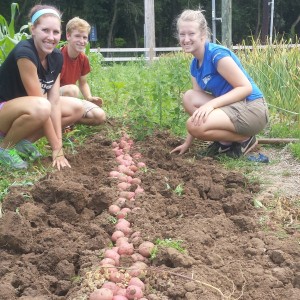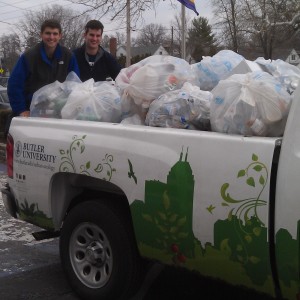by Wesley Sexton
 This Summer I had the unique opportunity to intern at the CUE Farm, and as part of my job I was charged with a few of the meticulous and labor-intensive responsibilities involved in growing fresh food. On the CUE Farm I learned very quickly that cultivating healthful food takes a lot of time and a lot of attention. My work this summer forced me to slow down and devote my contemplative energies toward the foods that we eat.
This Summer I had the unique opportunity to intern at the CUE Farm, and as part of my job I was charged with a few of the meticulous and labor-intensive responsibilities involved in growing fresh food. On the CUE Farm I learned very quickly that cultivating healthful food takes a lot of time and a lot of attention. My work this summer forced me to slow down and devote my contemplative energies toward the foods that we eat.
Of course, as a result, I have been able to learn about urban agriculture; but I also found myself confronted with questions that had lain unformed in my brain before this experience. Questions like: “Where does my food come from?” and “Does quantity trump quality in the food world?” suddenly wriggled themselves into my mind.
I have by no means been able to find comprehensive answers to these questions or many of the others that formed during my time on the CUE Farm. But the fact that these questions found their way into my mind certainly exhibits a depth of awareness that I did not previously possess before this summer. I now find myself becoming skeptical of foods at the grocery store – peppers shipped from Mexico or raspberries fallen to mold during the long ride over from California.
Amidst the vague questions still floating around in my mind, two things about urban agriculture seem quite clear:
- Locally grown produce will inevitably be fresher and healthier than produce shipped halfway across the country; and
- Considering the number of people currently living in cities or other places where fresh produce is somewhat unavailable, innovative approaches to growing fresh food must be sought out.
And perhaps with the right social environment, urban farming can help people gain access to locally grown, quality produce.
Although the CUE Farm and other urban farms like it often operate on a very small scale, the argument may be made that cultivating a smaller yield in a responsible way is preferable to the opposite approach. Personally, I believe that fresh, organic produce is an investment that is well worth the extra time spent. If more time and attention are paid to the substances with which we choose to energize our lives, I do not think that time and energy will have been misplaced.
Wesley Sexton is an English and Music major at Butler University, Class of 2016.


